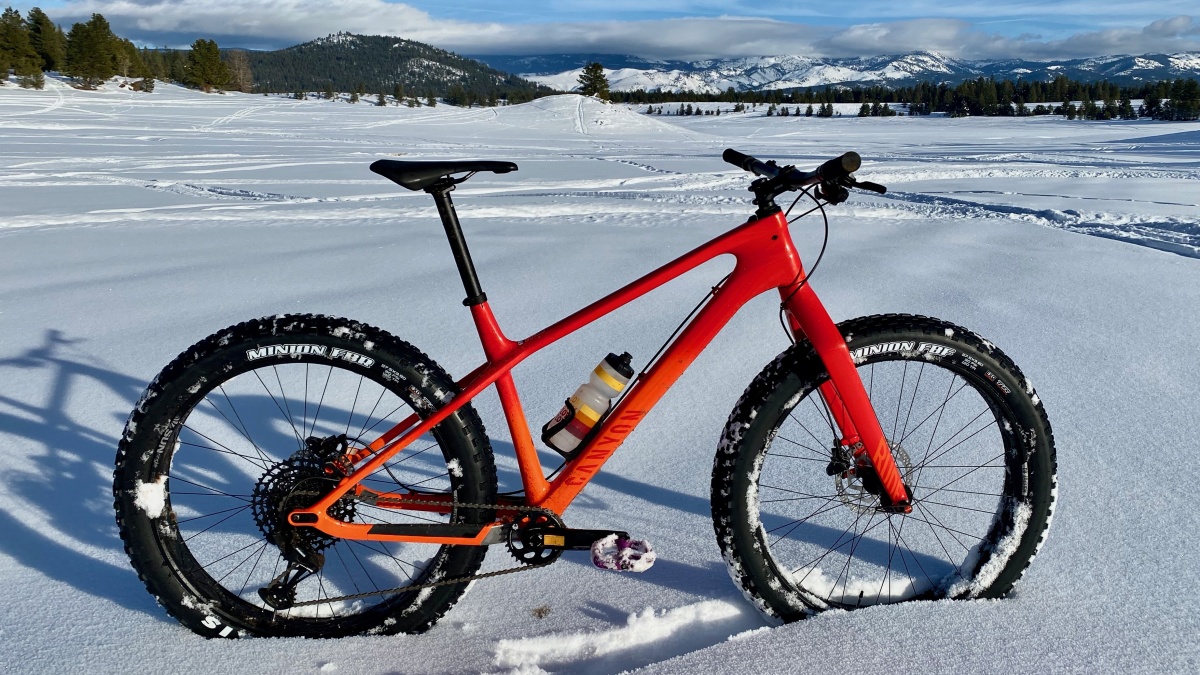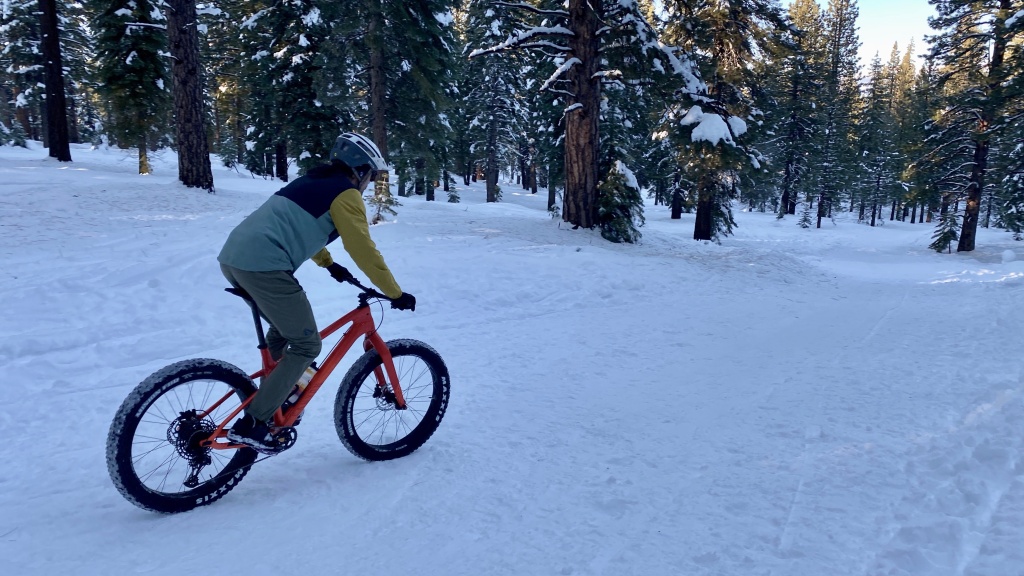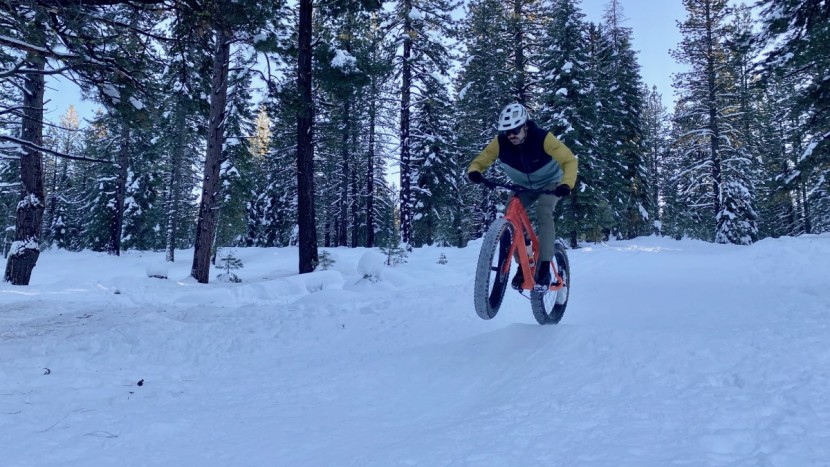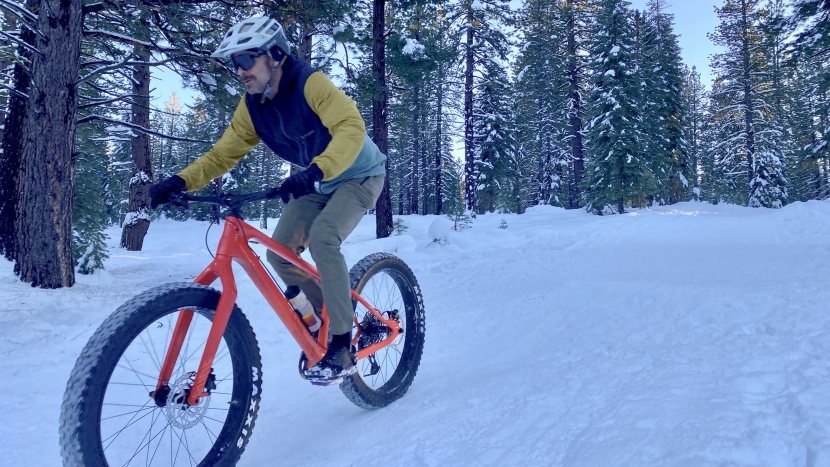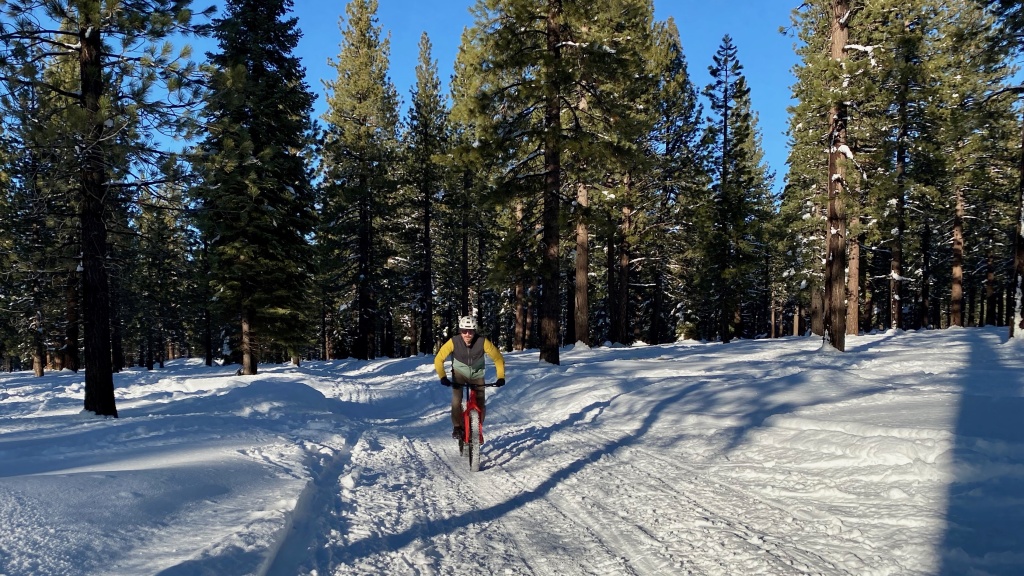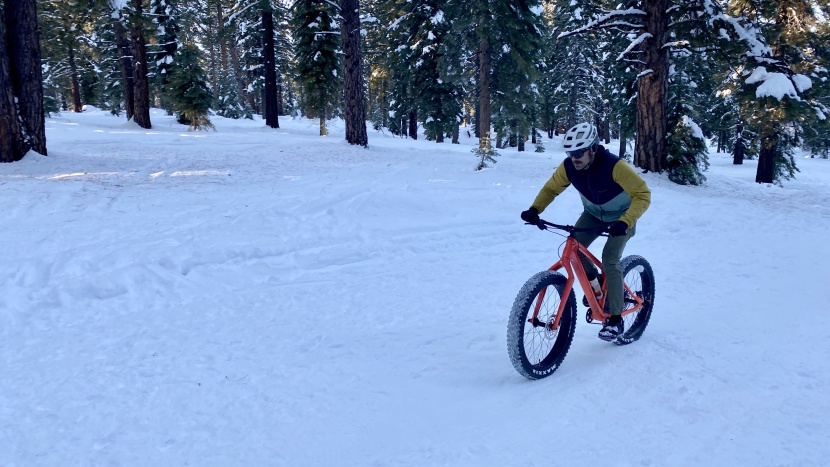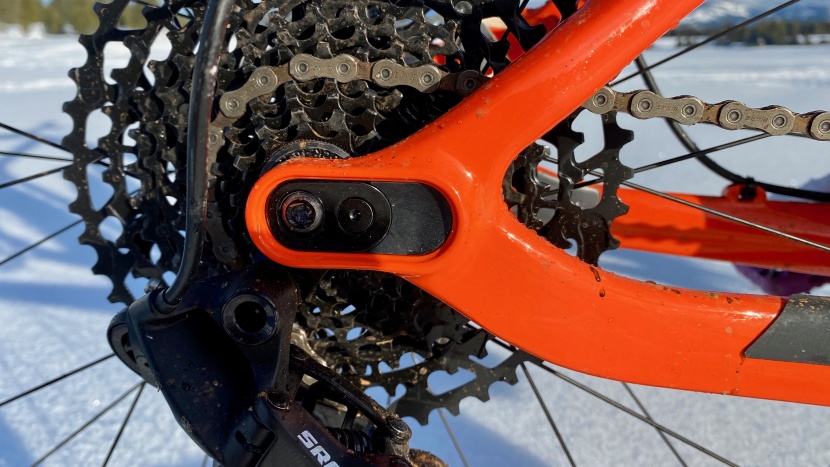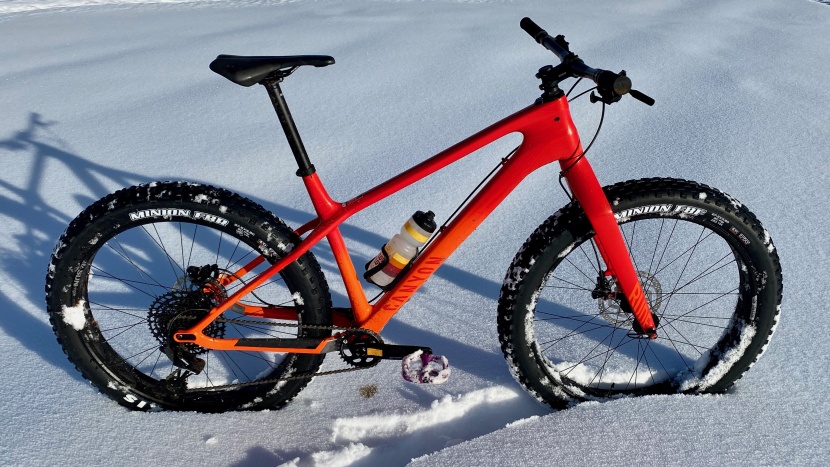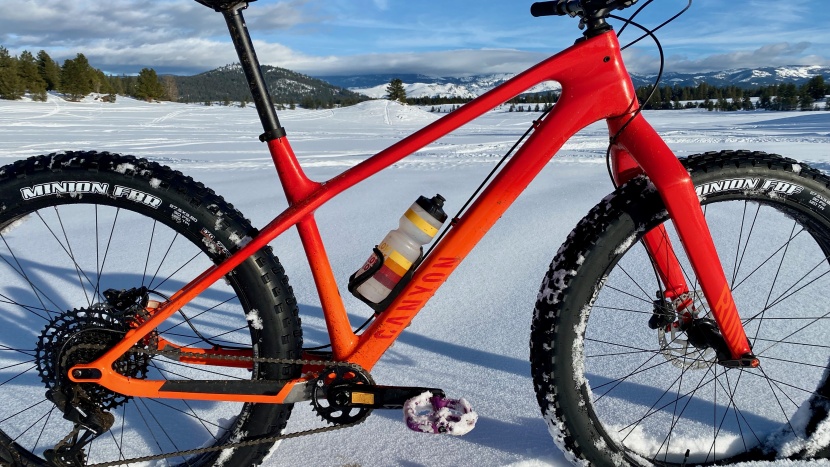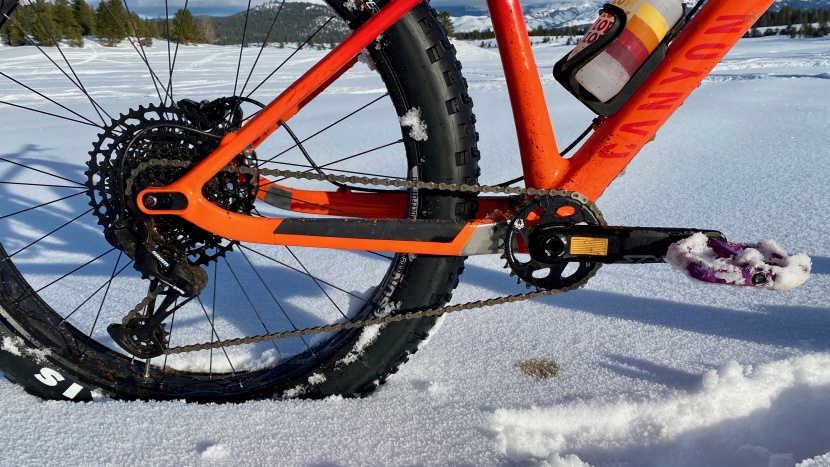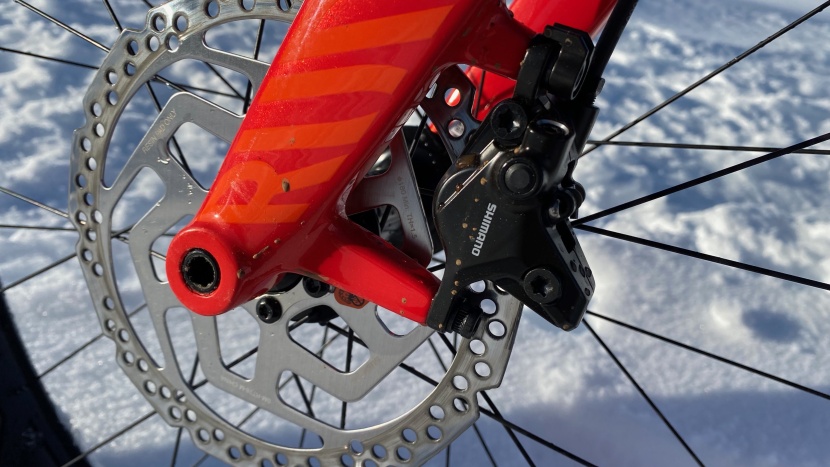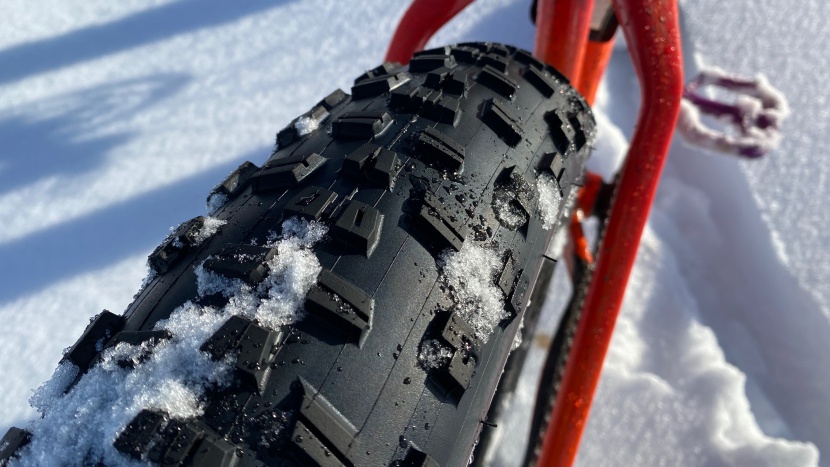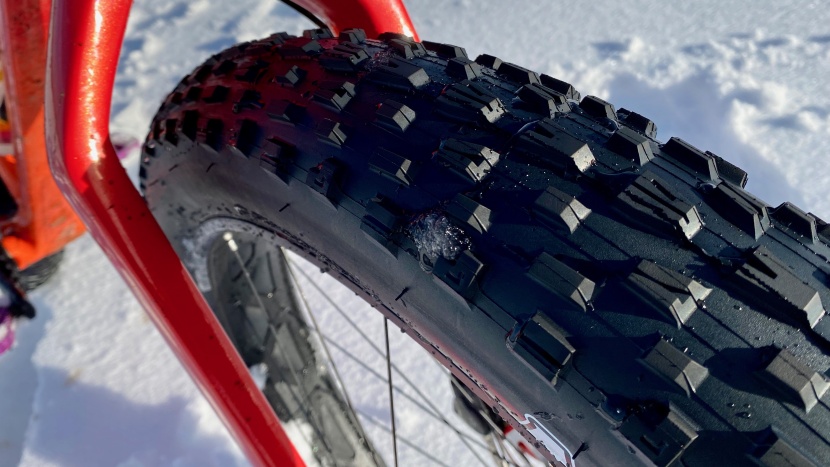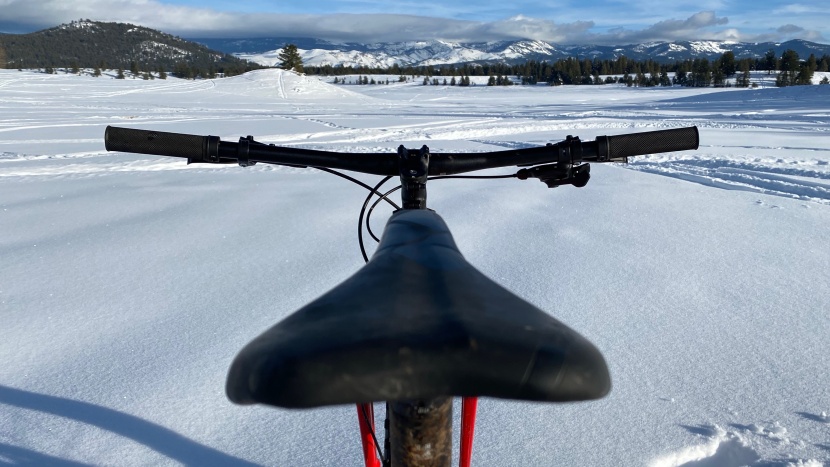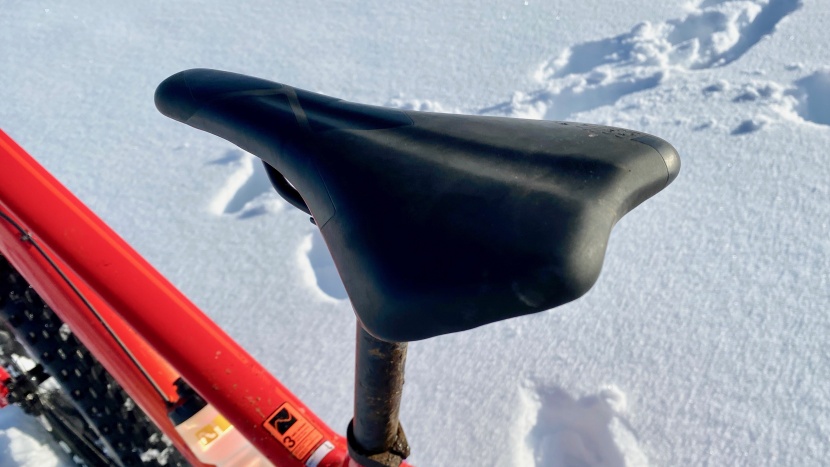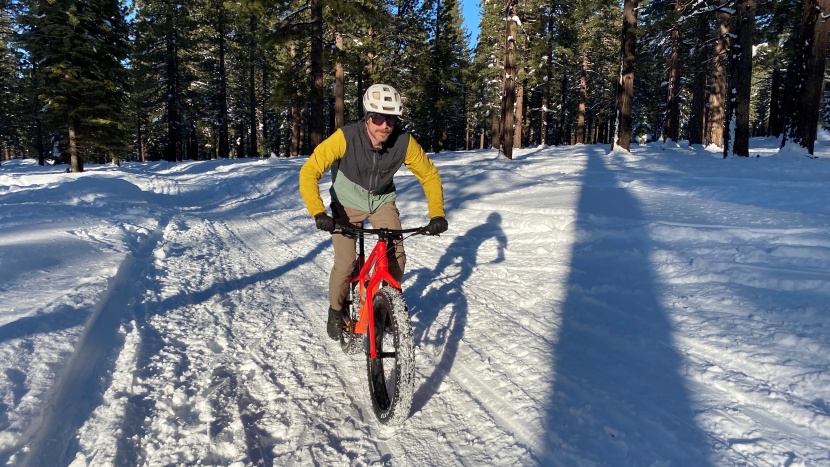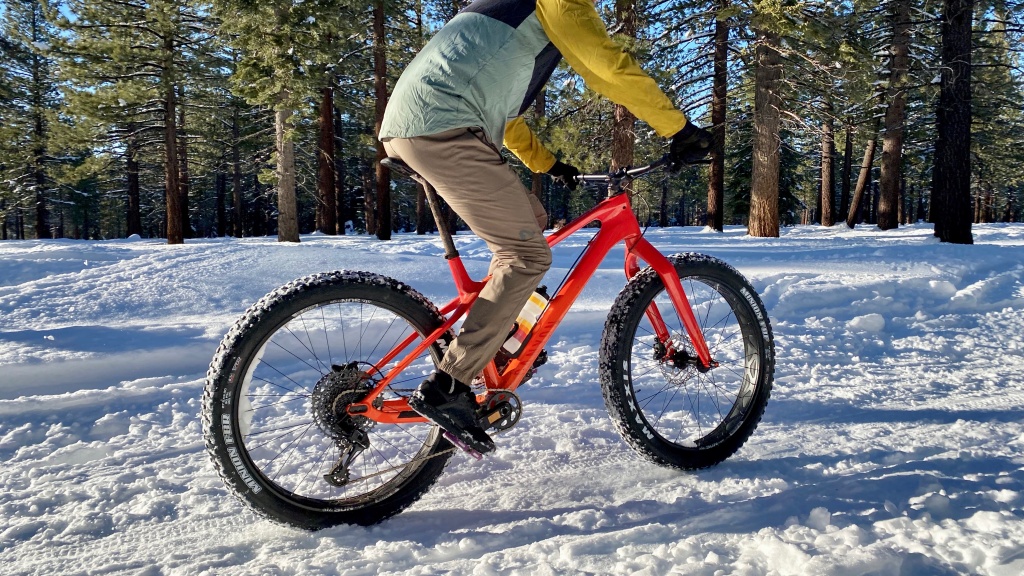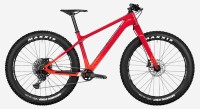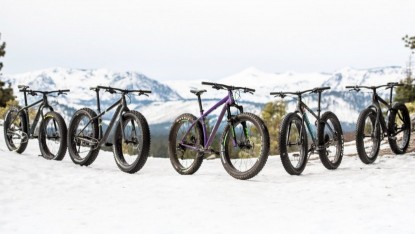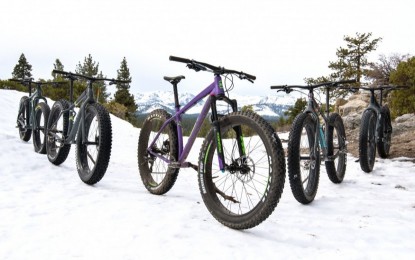
Our Verdict
Our Analysis and Test Results
Canyon is a consumer-direct brand that produces a very wide range of bicycles for all types of cycling. The Dude is their one fat bike model, and the CF 7 build is the only version currently sold in the US market (other builds are available in other markets). This bike features a lightweight carbon frame and budget-friendly components, keeping the price reasonable. It performs well when the rubber meets the snow, dirt, etc, and it feels light, fast, and efficient, but doesn't stand out much from the crowd.
2026 UpdateSince we tested the Dude, Canyon has changed its parts spec and lowered its price. Our original gripe with this bike was the Sram SX shifter, which has been replaced with a Deore trigger shifter, which should be much more ergonomic, especially with gloves. The bike still only has mounting points for a single bottle cage, so bikepacking isn't going to be in its skill set, but it's an otherwise awesome snow bike. Canyon calls the new bike with a dropper post, the Dude CF 8.
Downhill Performance
Most fat bikes are not made for shredding the gnar, even if the Dude looks worthy. Instead, their designs reflect the slower speeds and moderate terrain they will likely be used in. The Dude performs well enough on the descents for a typical fat bike. It has a fairly standard fat bike geometry that lends itself well to nimble handling and good control in fat bike conditions and at moderate speeds. The components all work well enough and don't detract from the bike's performance.
Like most fat bikes, the Canyon Dude has a somewhat conservative geometry that suits its intentions relatively well. It shares the same 69-degree head tube angle with most of the other models we tested, which works well enough for most of the downhill situations most people are likely to encounter on a fat bike. Where the Dude breaks the model a little in terms of geometry is its 465mm reach and 1,175mm wheelbase (size large) measurements. While not exactly long by today's standards, this bike is slightly longer than most other bikes in this category. This provides a roomier cockpit while descending and should feel a little more natural to mountain bikers while providing more stability at speed. The steeper head angle keeps the bike feeling lively but provides a speed limit when you point it downhill. The Dude has a nice balance of agility and stability that works well in most situations on moderate descents.
The parts attached to the Dude get the job done without impressing. The 2-piston Shimano MT410 hydraulic disc brakes actually work great for the moderate speeds and terrain that this bike is made for. We don't love the ergonomics of the brake levers, but admittedly, they work just fine. The cockpit setup works well enough and provides for sharp handling, although we'd prefer a handlebar with a little more rise to increase rider comfort and take a little weight off the hands. The Maxxis Minion FBR and FBF tires work well in most situations and are relatively versatile in their 3.8-inch width. That said, they don't provide as much floatation as wider options, and they don't have as much cornering traction or braking bike as other tires. A tradeoff for their faster rolling speed.
Uphill Performance
Riding in the flats or uphill is where the Canyon Dude impressed us the most. This bike is fairly lightweight, and the carbon frame is stiff and efficient when laying down the power. The geometry lends itself to responsive handling and a relatively comfortable seated pedaling position, whether you're grinding out a groomed track or scrambling up packed snow singletrack.
The Dude CF 7 has geometry numbers like a 69-degree head tube angle and a 73-degree seat tube angle that are fairly common among fat bikes. While we are accustomed to seeing slacker head tubes and steeper seat tubes on modern mountain bikes, these measurements work well for the intended purpose of riding a fat bike. The steeper head angle helps to keep the handling feeling sharp when negotiating sharp turns or tight, technical sections on the climbs. The 73-degree effective seat tube doesn't prop you up as high as some steeper seat angles, but it works fine for the moderate terrain and steepness you encounter on fat bike rides. The rider is lined up just a hair behind the bottom bracket, and power transfer feels quite direct and efficient thanks to the stiff carbon frame. The 465mm reach on our size large test bike provides a roomy cockpit, but we also noticed that it feels a tad longer than that measurement suggests with the slacker seat tube angle and a flat handlebar. This resulted in a slightly racier/aggressive body position for our long-legged six-foot-tall tester, with noticeably more weight on the hands. Swapping to a handlebar with a little more rise would be a quick and easy remedy that would enhance our overall comfort while riding the Dude.
While it may not exactly turn heads, the budget-friendly component specification works well on the uphills. Other than our gripes about not being able to position the shifter perfectly, the SRAM SX 12-speed drivetrain worked well for us during testing, and the range offered by the 30-tooth chainring and 11-50-tooth 12-speed cassette is plenty for just about any situation you'll encounter on a ride. The Maxxis Minion FBR/FBF tire combo in a 3.8-inch width is a versatile choice that works relatively well in many conditions, from groomed and packed snow to sand and even dirt. They roll fairly quickly and efficiently, given their size, and provide good, but not amazing, pedaling traction.
Versatility
The Dude CF 7 is a bit of a mixed bag in regards to versatility. It allows for changes to wheel size with adjustable dropouts, and the stock tires strike a good balance between snow and soft conditions. The slightly narrower Maxxis tires are more suitable for use on dirt than wider options. That said, it has very limited mounts and bosses for water bottles and accessories on the frame and fork, so anyone looking to use this bike as a bike packing or adventure riding rig is limited to bags that strap or clamp onto the frame or handlebar.
One thing the Dude has going for it is that it is relatively lightweight and fast-rolling, making it a solid option for riding on groomed trails, packed singletracks, and possibly even for some fat biking racing. Ditching the tubes in the tires and setting them up tubeless could also shave a significant amount of weight. The stock 3.8-inch wide tires work well enough on firm snow and sand, and they aren't nearly as draggy or sluggish when you ride on dirt as most wider options. There is plenty of space to run wider tires as well. The Dude frame is also compatible with suspension forks like the Manitou Mastodon and has a cable port for internally routed dropper posts should you desire to set it up with either of those components.
The Dude loses a little ground to the competition in the versatility department due to its lack of bottle bosses and frame mounts. This bike has a total of one set of water bottle bosses on the down tube of the frame, and that is it. There are no other mount points anywhere on the frame or fork for mounting bolt-on bags or other accessories for carrying gear. We feel this is somewhat limiting from a bike packing and adventure riding standpoint compared to other models that prioritize this in their design. That said, you can still strap bags to the handlebar and within the front triangle or clamp them to the seatpost should you desire to carry gear on this bike.
Build
The Dude CF 7 is built around Canyon's Dude carbon fiber frame that is paired with a Canyon Rude carbon fiber fork. The frame has very clean lines and a refined look with internal cable routing for the shifter cable and a dropper (if you choose to put one on), with both brake lines routed outside the frame for a less polished look but much easier serviceability. The Dude has adjustable rear dropouts to allow for changes to wheel and tire size should you ever wish to swap them out, and they claim it can be used with 26 x 4.8-inch wheels/tires or 29 x 3.0-inch wheels/tires, in addition to the 27.5-inch wheel setup that comes stock. It has standard fat bike axle spacing of 15 x 150mm in the front and 12 x 197mm in the rear. It has a press-fit bottom bracket, a very thin chainstay protector, and one set of water bottle bosses on the frame's downtube. The bike comes with 3.8-inch wide tires, but there is ample clearance to run wider tires if you prefer. There is also a knock-block type feature attached to the frame/headset that limits how far the handlebar and fork can twist. It seems unnecessary with the carbon fork attached, but we imagine it is useful to prevent frame damage if a suspension fork is used.
The CF 7 build of the Dude is budget-oriented, and that is most apparent in the drivetrain specification. It comes with a full SRAM SX Eagle drivetrain, and while it is far from our favorite, it works well enough for general fat biking. It comes with a 30-tooth chainring paired with the 12-speed cassette with cogs ranging from 11-50 teeth, providing a massive gear range. We don't love the weight of the SX cassette, and the shifter is hard to set up perfectly, given that it doesn't mate with any brakes. We find it's either too close to or too far from the thumb when the brake lever is in the ideal position. Minor gripes, but gripes nonetheless. Braking duties are given to a set of 2-piston Shimano MT410 hydraulic disc brakes with 180/160mm rotors front/rear. We don't love the ergonomics of the brake levers, but there's no denying that these brakes are plenty powerful for this bike.
The Dude rolls on 27.5-inch diameter Sun Ringle Mulefut 80 SL wheels. These are a very common stock wheel choice for fat bikes, and they work well with a massive inner rim width of 74.4mm that mates well with super wide fat bike tires. Canyon chose a set of Maxxis Minion FBF and FBR tires in a 3.8-inch width for the Dude. These tires are impressively versatile and work well on packed snow, sand, and dirt, with enough tread to provide good cornering, braking, and pedaling traction while remaining relatively fast rolling. The tradeoff with the skinnier 3.8-inch width is that they don't provide as much floatation as wider tires, and the tread design isn't quite as aggressive as some other options. Should you choose to swap them out for something different, it should be noted that fat bike tires can be pretty expensive, but they typically don't wear out nearly as quickly as regular mountain bike tires (though that depends on the surfaces you ride them on).
Canyon makes a full range of house-branded components under the Iridium name, and the cockpit consists almost entirely of them. This includes an alloy stem that clamps an alloy handlebar with 5mm of rise and some lock-on grips. While there's nothing wrong with any of these components, we would have preferred a handlebar with a touch more rise to reduce the longer feel of this bike's reach. At the back of the bike, a rigid alloy seatpost supports a relatively comfortable Selle Italia X3 saddle. Should you wish to install one, the frame features an internal routing port for a dropper seatpost cable.
Geometry
The Canyon Dude CF 7 has a geometry that is an interesting blend of some conservative and some progressive numbers. Like many other models we've tested, it has a fairly conservative 69-degree head tube angle and a 73-degree effective seat tube angle. Where the Dude breaks the mold somewhat is in its reach and wheelbase measurements. Our size large test bike has a moderate length, 465mm reach that is more in line with regular trail bikes, and a 1,175mm wheelbase that's about 20mm longer than most. The chainstays measure 439mm, although they are adjustable by approximately 25mm to accommodate different wheel sizes, and that shorter length helps to keep the bike feeling a little more lively. The Dude comes in 3 sizes, S, M, and L. Our large test bike tipped the scales at fairly svelte 30 pounds and 5 ounces with tubes and without pedals.
Should You Buy the Canyon Dude CF 7?
If you're looking for a fat bike for general day-to-day fat biking, the Dude CF 7 is a great option to consider. It's good for ripping around on snow, sand, or even dirt singletracks, and it's light and efficient enough to try your hand at fat bike racing if that's your thing. The functional component spec isn't flashy, but it works well enough while keeping the price of this carbon-framed beauty quite reasonable.
What Other Fat Bikes Should You Consider?
The Fezzari Kings Peak took us by surprise and turned out to be the top-rated fat bike in this round of testing. It comes with similar components to the Dude, but its longer and slacker geometry increases confidence on the descents, and the wealth of bottle and accessory mounts make it better prepared for bike packing and adventure riding. It's also very competitively priced for a bike with a carbon fiber frame. If you're interested in a little more comfort, the Trek Farley 7 is an interesting option to consider. This aluminum-framed bike comes with a suspension fork and a dropper seatpost that makes it much more forgiving on the descents and on rough or chunky trails.
| Awards | Best Bang for Your Buck Carbon |
|---|---|
| Price | $2,299 List |
Overall Score  |
|
| Star Rating | |
| Bottom Line | A reasonably priced carbon fiber fat bike that's lightweight and efficient |
| Pros | Affordable for carbon frame, well-rounded performance, reasonable weight |
| Cons | SRAM SX shifter ergonomics, limited frame and fork mounts |
| Rating Categories | Canyon Dude CF 7 |
| Downhill Performance (30%) | |
| Uphill Performance (30%) | |
| Versatility (25%) | |
| Build (15%) | |
| Specifications | Canyon Dude CF 7 |
| Wheelsize | 27.5" |
| Weight w/o pedals | 30 lbs 5 oz |
| Frame Material | Canyon Dude CF (carbon fiber) |
| Frame Size | Large |
| Available Sizes | S-L |
| Fork | Canyon Rude CF |
| Wheelset | SUNringle Mulefut SL 80 |
| Front Tire | Maxxis Minion FBF 3.8" |
| Rear Tire | Maxxis Minion FBR 3.8" |
| Shifters | SRAM SX Eagle |
| Rear Derailleur | SRAM SX Eagle |
| Cranks | Truvativ Stylo 6K DUB |
| Chainring | 30T |
| Bottom Bracket | SRAM Pressfit DUB |
| Cassette | SRAM PG-1210 11-50T |
| Saddle | Selle Italia X3 |
| Seatpost | Iridium Alloy |
| Handlebar | Iridium Flatbar |
| Stem | Iridium Alloy |
| Brakes | Shimano MT410 |
| Head Tube Angle | 69-degrees |
| Reach (size Large) | 465mm |
| Wheelbase (size Large) | 1175mm |
| Chainstay Length | 439mm |
| Seat Tube Angle (effective) | 73-degrees |
| Warranty | Six Years |


